You are currently browsing the flash category
Picking up on Monday’s “Trial of the Flash” post, Daniel T links to an interview with its writer, Cary Bates, with relevant info. Daniel T has a choice quote from the interview about Crisis and how it affected his story (and what could have come afterwards).
And Scipio…ah, Scipio, fellow veteran of the early 2000s comicsweblogosphere, the horrors we’ve seen. Anyhoo, Scipio popped in to remind me of one of the more…out-there elements of the whole “Trial of the Flash” storyline: Nathan Newbury:
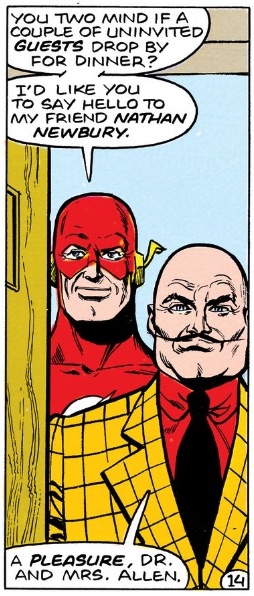
Okay, SPOILERS for a nearly 40-year-old story just below.
Mr. Newbury was an accountant who was serving on the jury for the Flash’s trial. But, as we learn eventually, Mr. Newbury was…”psychically possessed” by a mind from the distant future who was convinced of the hero’s innocence. And also spoke in an overly elaborate manner that I think was said future mind having to communicate using Newbury’s ingrained speech patterns, but I don’t know if that was ever made explicit. (Sorry, I just reread #350, wasn’t going to dive back into the whole series, like, tonight.)
Now by any reasonable standard, once ths court found out about this level of jury-tampering, it’d all be declared a mistrial and they’d start over, right? Well, not according to this news report:
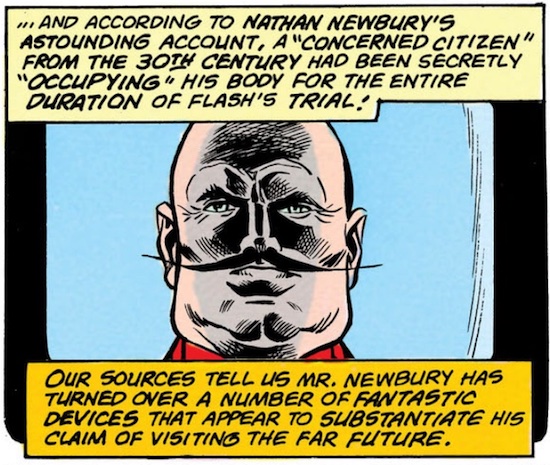
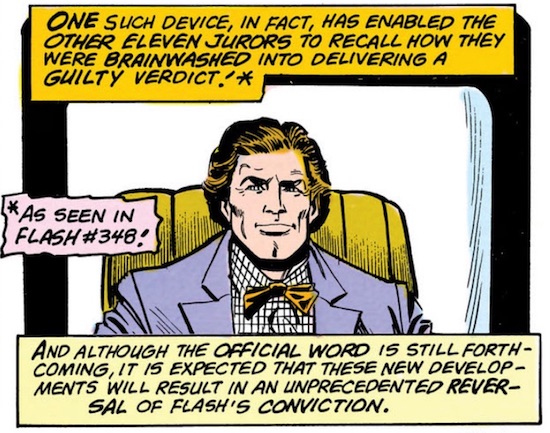
I’ve said before that the nightly news in the Marvel Universe would be indistinguishable from watching wrestling, and that the televised news reports in the DC Universe would instead inspire fear and madness in those who watched. I think this bit of insanity supports the argument. Though I suspect a certain forthcoming Big Trial in the real world may surpass even these wild events. I’m putting my nickel down on “space aliens” in the office pool.
From what I read of Nathan Newbury’s appearance in #350…I mean, it wasn’t so bad. It wasn’t quite the deus ex machina it feels like it should be, if only because the future mind in question has a prior connection to the Flash. And it’s not like Flash comics haven’t been rife with time travel shenanigans over the decades.
So ultimately the most troubling thing about Mr. Newbury is his moustache. That’s a moustache that challenges you. And frankly, the true surprise villain of the piece has a sidekick in this issue with the name of “Snurff,” and that, my friend, is the real crime.
What’s nice about Flash #350, the last of the series, is that Bates (according to the interview linked above) was given enough warning and time to lay groundwork for events coming in Crisis on Infinite Earths via foreshadowing and fore-blatantly-just-saying-he’s-gonna-die-ing.
Plus, there’s the fact that the issue’s villain (I don’t know why I’m being coy, I said there’d be spoilers) is trying to resolve “time turbulence” caused by all the time-traveling bullshit that had been going on (like the Reverse-Flash dying centuries before he was born). For selfish reasons, he’s actually trying to do a good thing, even somehow, it’s implied, saving the Flash from his impending death. He’s practically begging the Flash to let his plan play out even as he’s caught, but to no avail, adding to the coming tragedy that Barry Allen could’ve escaped but for his own actions.
Pretty wild stuff for the final issue of the superhero that ushered in the Silver Age (unless you’re one of those Martian Manhunter truthers). The final caption boxes on the last page read “And they lived happily ever after…for a while…” just to twist that knife a little more. Ah well, it’s all moot now, as thanks to DC’s ongoing plan to make Crisis “never not was” it’s mostly been undone, with Barry being dragged back into current continuity with varying levels of success.
Back then, though, before all the death and return and death again of characters, some of whom don’t even have the decency to stay dead a full month or so before being brought back after their highly publicized demise — it’s a little hard to convey the uncertainty DC fans had, knowing that characters could die or at least be fundamentally changed in this coming Crisis event. And that if the Flash could go, who else is safe? It was quite the feeling, one that was unique to superhero comics of the period.
So my mention of Cary Bates in my last post got some of you talking about the storyline that got Barry “Silver Age” Flash marked for death in the soon-to-follow Crisis on Infinite Earths, “The Trial of the Flash.”
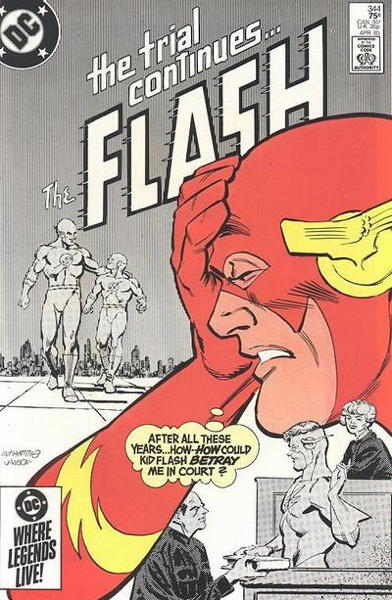
As I am once again getting a late start on the ol’ blogging yet again, I’m just going to say a few words about this series and we can pick up the discussion in the comments or maybe later as another full post.
I’m taking the issue numbers that comprise this run from the one (and I think only) time it was all reprinted under one cover, the black and white Showcase Presents thick paperback. The book includes #323-327, #329-336, and #340-350 (the last issue of the series.) Why they skip #337-340 is something of a mystery, aside from the issues themselves maybe not referencing the trial in-story. (#328 was a reprint issue.) The first issue is a Pied Piper story, and then the next two are the first appearances of Big Sir. The latter omission is most puzzling given that an event in that story leads directly to a dramatic reveal in the trial itself.
For the uninitiated, “The Trial of the Flash” is a story about our hero killing (accidentally or not) his enemy the Reverse Flash as he attempted to murder the Flash’s new bride. As a consequence, the Flash enters the legal system as the courts try to decide whether or not the Fastest Man Alive was guilty of…MOIDER.
At the time, apparently some people thought this was the Slowest Story Alive, as they quickly tired of this interminable plotline. To be fair, it was only a couple of years long, but still at this point at DC Comics, an extended storyline like this was the exception, not the rule, particularly in comics like The Flash which had mostly Done-in-One or the occasional two or three-parter stories. I remember, just a couple of years earlier, the story that opened Saga of the Swamp Thing got some pushback from readers for its length.
It seems a little odd to me, in that it wasn’t like we weren’t getting mostly standalone stories along the way, with the continuing subplots interspersed with the primary plot of the issue (both in Flash and Swamp Thing. Though perhaps in Flash, once the trial became the primary driver for the last year’s worth of books, it got to be a bit much, I suppose. Balancing the need between satisfying monthly reads and an extended plotline can be tricky, and for readers accustomed to a different sort of reading experience.
Personally, I enjoyed the trial storyline, which was something you really hadn’t seen in comics before…a superhero facing legal consequences for a fatalitiy committed in the course of his actions. And it kinda sorta played out in a real time, almost, in that in The Real World a trial like this takes forever. I mean, most trials don’t end with, like, time travel, far as I know.
I have to do a little more research, but I think sales were…not great on this series as it reached its eventual ending at #350 (relatively speaking…I’m sure comics people now would push their own grannies off cliffs for the numbers it was getting). I’m sure that was one of the factors that went into deciding the Barry Allen Flash would be on the chopping block for the then-imminent Crisis on Infinite Earths.
But I still think it wasn’t a bad run of The Flash, that maybe was just a little too ahead of its time for the story it was trying to tell.
Update to the William Messner-Loebs talk from last week (reminder: here’s his GoFundMe) — a couple of you noted that DC has announced a new omnibus reprint of his (and Greg LaRocque’s) run on The Flash.
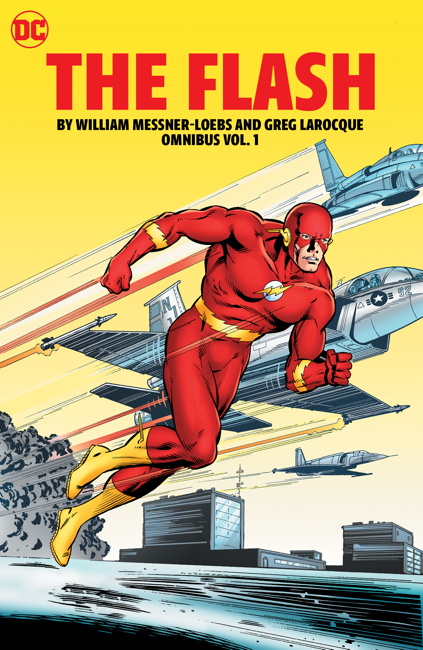
I haven’t found an issue listing yet, but that’s definitely the cover from the first issue on that omnibus there. That has me wondering if they’re going to include the first 14 issues of this Flash series written by Mike Baron, or just pick up from #15, Messner-Loebs’ first. I mean, I presume not, I just see Loebs’ name there. It’s good stuff, regardless, and Loebs picks up from Baron’s run, fleshing out situations and characters and keeping things weird and exciting.
I would kind of preferred paperbacks, but as was noted in my comments, maybe those will come later. But so long as some money is getting to Loebs from this, it’s a welcome move from DC.
In which the Golden Age Flash, Jay Garrick, gets his super-speed abilities by not paying attention during his smoke break:
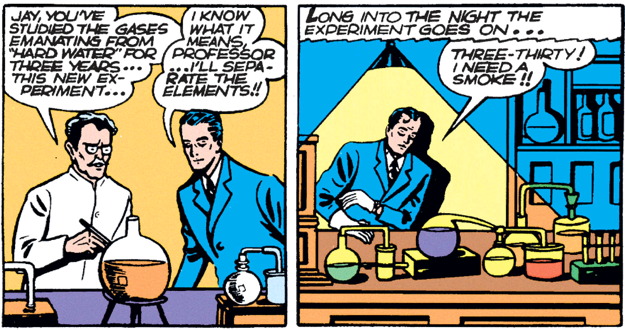
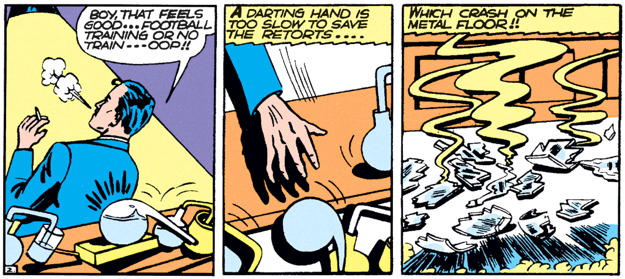
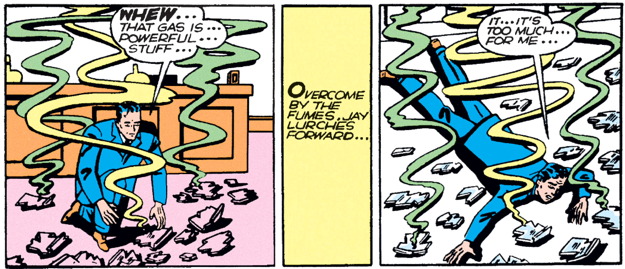
from Flash Comics #1 (January 1940) by Gardner Fox and Harry Lampert















